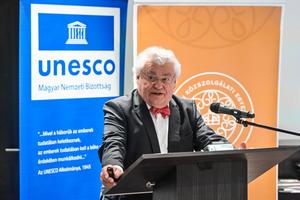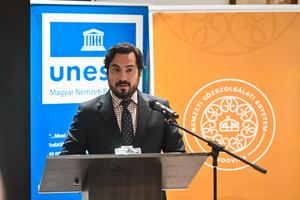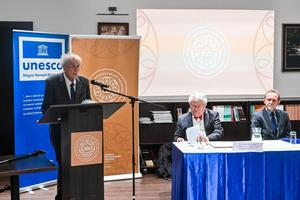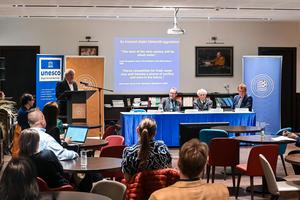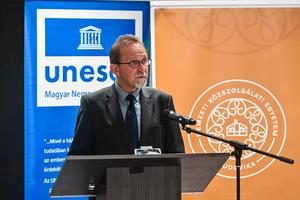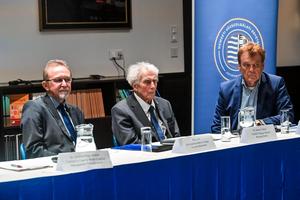The Ludovika University of Public Service (LUPS) is establishing the UNESCO Chair on Water Conflict Management (UCW) as part of the UNESCO network. The department is founded by the Faculty of Water Sciences (FWS), which operation constitutes a prominent element of the faculty's scientific and international strategy, led by the university professor of the FWS, András Szöllősi-Nagy. The founding event of the institution took place on May 2nd in the John Lukacs Discussion Room of the university.
In his welcoming speech, Pier Paolo Pigozzi, the Deputy Rector for International Affairs of LUPS, expressed that one of the most urgent challenges of the world today is access to water. He stated that LUPS' mission is to provide strategic education and research that address present challenges, emphasizing the importance of establishing international partnerships enabling all faculties and research institutes to address global issues. "In addition, it is important for our students not only to acquire theoretical and scientific knowledge but also practical knowledge to gain insight into what is happening in the world," Pier Paolo Pigozzi emphasized, adding that the newly established department aligns well with LUPS' mission.
Miklós Réthelyi, the President of the Hungarian National Commission for UNESCO, recalled the purpose of UNESCO's establishment in 1946. He recounted the thoughts of Julian Huxley, the organization's first Director-General, who believed in achieving peace, security, and human well-being through educational and scientific relationships. He also drew attention to the fact that the Hungarian National Commission for UNESCO is already preparing to celebrate the 250th anniversary of the birth of Teréz Brunszvik and the 200th anniversary of the founding of the Hungarian Academy of Sciences in the coming years.
In his address, Pál Réthy, the Deputy State Secretary for Public Employment and Water at the Ministry of Interior, reminded that water-related conflicts are not new, as the formation of all ancient societies was determined by water, and it played a key role in the development of human civilizations. He detailed that resources are depleting, and in his view, the origin of today's wars can be traced back to the possession of freshwater sources. Therefore, the Deputy State Secretary highlighted the importance of cross-border cooperation among other things.
Speaking about the strategy and activities of the UNESCO Chair, András Szöllősi-Nagy, the university professor of LUPS FWS, explained that decades ago, world leaders had already envisioned that the wars of the 21st century would be about water. He recalled that 4500 years ago, there was already a war for water in Mesopotamia. He also added that nowadays, most of climate change is about water, with one of its main causes being a radical decrease in per capita water supply. "We have reached a turning point because today people determine what will happen with water," emphasized the professor.
Regarding the vision of the new department, he highlighted that conflicts should be turned into cooperation as soon as possible, and a common vision should be built from it. He said that new sciences, new technologies, including digital water management, help in this. "Will there be enough water to avoid conflicts?" Professor Szöllősi-Nagy posed the question, stating that the problem can be solved if there is political will and readiness to manage conflicts. He also emphasized the importance of building international networks.
Ferenc Miszlivetz, the Director-General of iASK in Kőszeg and the Head of the UNESCO Chair on Cultural Heritage Management and Sustainable Development, emphasized at the event that culture cannot be neglected when discussing sustainable development. The speaker also highlighted the importance of networks that need to be operated. He believes that man-made disasters will increase, so governments and scientists must establish regular, direct communication with each other to more effectively eliminate tragedies.
Rock Missamou, a graduate student of LUPS FWS, expressed his opinion on how young people from the developing world see water conflicts. Supported by data, he detailed that last year in Africa, 226 million people could not access water, and there are currently many brutal water-related conflicts heard of. He stated that water is sometimes a weapon and sometimes a target on the continent, and in this dramatic situation, it is hardly possible to navigate. He explained that 20% of young people are climate-conscious, 10% are climate-neutral, and indifferent to their environment, but 70% are climate skeptics: the latter are financially unstable, partly educated, but see their future outside Africa. "This also shows that education is very important, and UNESCO plays a crucial role in this, which Africans greatly appreciate," emphasized Rock Missamou.
As the event concluded, Tamás Pálvölgyi, the Vice Dean for International and Strategic Affairs of LUPS FWS, stated that the goal is to pass on knowledge in the field of water science, but it is also necessary to find the target group for whom the information that contributes to the management of water conflicts is essential.
Text: Éva Harangozó
Photo: Dénes Szilágyi
